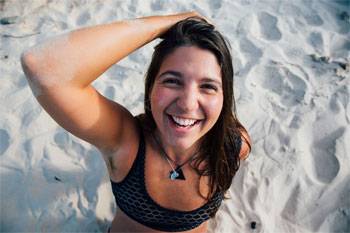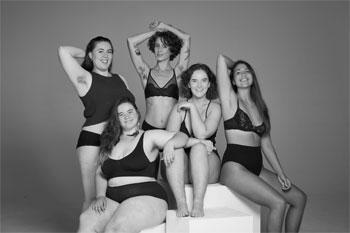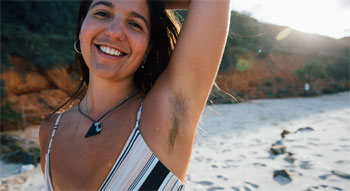Alex Andrews Get Hairy February Interview

Australia's First Peer to Peer Campaign for Women against Gendered Violence Returns This February
Get Hairy February, Australia's first peer to peer campaign for women against gendered violence, has launched for its second year this Thursday 1 February. Encouraging women to stop shaving their legs and underarms for the month of February, the initiative aims to empower women across Australia to challenge expectations, take action against inequality and raise funds to help eliminate violence against women.
Alex Andrews, Founder of Get Hairy February said: "Smooth, hair-free skin is a westernised standard of beauty that over 95% of Australian women conform to. Why? Because in 1915, a large company ran an advertising campaign telling us that hair on a woman's legs and underarms was ugly and embarrassing. Now, girls as young as 10 shave and remove their leg and underarm hair to avoid the embarrassment of their natural bodies".
Get Hairy February encourages women to take one month out of their normal shaving routine and invite their friends, family and colleagues to sponsor the initiative. The campaign launched in February 2017, raising over $40,000 dollars, with 450 women participating.
"While the choice to remove or keep my body hair has always been mine, I can't help but feel like that choice would be a whole lot easier if it didn't come with a feeling of shame, guilt or judgement", says Andrews. 'Body hair is just hair but what you do with it is powerful, and now, more than ever we need opportunities for our community to come together around issues of gender equality and violence against women."
Donations made to Get Hairy February will go towards services that directly support women affected by domestic violence and programs designed to help eliminate gendered violence. 1 in 3 Australian women will experience violence, with 44% of sexual assault occurring before women turn 18.
Get Hairy February kicks off from 1 February. For more information on Get Hairy February, visit www.gethairyfebruary.org.
 Interview with Alex Andrews, Get Hairy February, Founder and Director
Interview with Alex Andrews, Get Hairy February, Founder and Director
Question: What inspired you to begin Get Hairy February?
Alex Andrews: After my own personal experience allowing my natural body hair to grow I wanted to unite with other women and encourage others to give it a go too. It's a really simple way of highlighting inequality and raising money for an important cause. We have very few opportunities as women to take action against inequality while being supported by our community. When you take part in Get Hairy February you take action by letting it grow and your friends and family support you by donating to eliminate the worst kind of inequality, violence against women.
After wondering why I'd never seen my underarm hair, Google quickly informed me that women didn't always remove it. Instead a significant turning point began in 1915 when the hair removal industry decided they wanted to target women to generate more revenue. They ran a very successful advertisement in a large womens magazine deeming women's body hair -objectionable'. Words like -ugly', -unclean' and -embarrassing' were, and still are used, to describe women with body hair.
This made me consider what else I was doing to my body simply because a it had been effectively marketed to my great grandmother. I questioned why I was doing something that was painful, took up my time, effort and money that men are not expected to do. It made me wonder why I had changed my natural body since I was 11 years old just to be considered acceptable. Other inequalities started to unravel and I began to consider other ways I was restricted by the expectations society places on women.
Gender inequality permeates all aspects of our lives. It's often difficult to define and difficult to see. Body hair is visible and a very clear double standard in the way men and women's bodies are policed.
Get Hairy February was an opportunity to bring these ideas together in a fun and simple way that could unite people around issues like equality and gendered violence. We're very familiar with growing hair for a good cause in Australia so why not have a campaign for women to let it grow too?
It's a great opportunity to take action, challenge expectations and raise money to eliminate violence.
Question: Can you talk about your hopes for this year's campaign?
Alex Andrews: We hope to spread the word about Get Hairy February and encourage women all around Australia to sign up and take part! We're looking forward to the community getting behind the cause and donating to help eliminate violence against women. We hope to inspire lots of conversations about body hair, equality and ending violence, at the dinner tables, in offices and amongst friendship groups around the country.
Question: What message do you hope to spread with Get Hairy February?
Alex Andrews: Get Hairy February is spreading the message that inequality affects all aspects of our lives and our body hair is just one of them. We hope the community see this symbolic act of women letting it grow as an example of how widely women's bodies are policed and how deeply inequality goes.
We hope to spread the message that all people who identify as women should be free to decide how they express their femininity without judgment, shame or stigma.
We hope this campaign sparks the community to not only talk about #metoo and #timesup but the importance of putting our hands in our pockets and supporting the services working to eliminate violence and support those affected.
Get Hairy February encourages the community to see that violence against women is a symptom of gender inequality and in order to eliminate violence we need equality in all areas.
We hope women feel empowered to embrace their natural bodies and let it grow. It's just one month and it's for such an important cause.
Question: How many women do you hope to see participate, this year?
Alex Andrews: Last year we had over 400 women take part and we would love Get Hairy February to grow in 2018.
Alex Andrews: The removal of body hair is an expectation that falls almost solely on women, an obvious battleground for inequality. On a woman's body, hair is labelled -gross, dirty and undesirable'. Shaving is a Westernised standard of beauty which over 95% of Australian women conform to. Refraining or even forgetting to shave can induce feelings of shame, embarrassment and disgust. his expectation serves little purpose other than to support a billion dollar beauty industry intent on making women feel like their natural bodies are unacceptable.
Question: Why is the Get Hairy February campaign run throughout the month of February?
Alex Andrews: Summer is in full force during February in Australia and this means underarm hair and leg hair will often be on display. A crucial aspect of the campaign is challenging the expectation that women should have smooth hair-free skin - and part of that involves visually changing what people expect to see on a woman's body.
Get Hairy February is about ensuring we all have the choice to shave or not to shave - that means being able to choose not to shave without shame and stigma. We hope women feel empowered to let themselves grow, embrace their natural bodies and be proud to be involved in community that demands equality and safety for all women.
 Question: Where do the funds raised for the Get Hairy February campaign go?
Question: Where do the funds raised for the Get Hairy February campaign go? Alex Andrews: Get Hairy February funds services that directly support women affected by violence and programs designed to help it all together.
This includes supporting the Full Stop Foundation, the organisation behind Rape & Domestic Violence Services Australia. Their services include 24/7 telephone crisis counselling for those who have experienced or are at risk of sexual assault, family or domestic violence. Full Stop also runs prevention programs in the community to help eliminate gendered violence.
With 44% of sexual assault occurring before the women turn 18, donations to Get Hairy February go to sponsoring schools to receive Empowered Together's consent and sexual assault workshops for secondary school students. The more Get Hairy February raises this year the more schools will receive this prevention program for free in 2018.
Question: How does gender inequality relate to violence against women?
Alex Andrews: The World Health Organisation, VicHealth and several other organisations have recognised gender inequality as a cause of violence against women and communities with greater economic and social inequalities between genders experience higher rates of physical and/or sexual violence towards women. Gender equality is essential to the prevention of rape and domestic violence against women in Australia and around the world.
MORE





